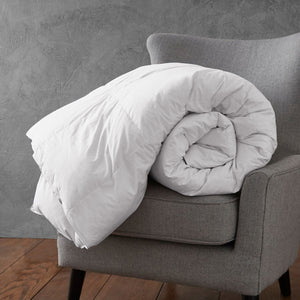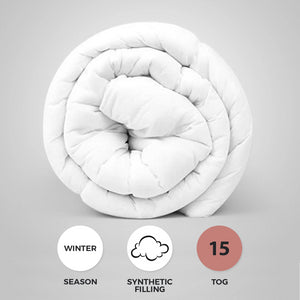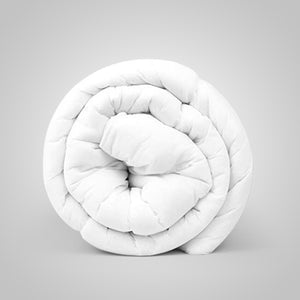What Is The Best Type Of Duvets For Hot Sleepers?
Sleep is a vital aspect of our well-being, and for hot sleepers, finding the right bedding can make all the difference between a restful night and tossing and turning in discomfort. Night sweats, a common issue among hot sleepers, can be triggered by various factors.
In this comprehensive guide, we'll explore the most common causes of night sweats, delve into the types of duvets tailored for hot sleepers, discuss thread counts and duvet fillings, and provide practical solutions to stay cool during the night.
What Causes Night Sweats?
Before we explore the world of duvets designed for hot sleepers, it's crucial to understand the common causes of night sweats. Hormonal changes, medical conditions, medications, and external factors like room temperature all trigger excessive sweating during the night. Identifying the root cause can help individuals make informed choices when selecting bedding that promotes a cooler and more comfortable sleep.
Types of Duvets for Hot Sleepers
A. Lightweight Duvets
Materials and Fill Options
Lightweight duvets are designed with materials and fill options prioritising breathability and heat dissipation. Common materials include microfiber and down alternative serves, balancing insulation and ventilation. These duvets are ideal for hot sleepers, preventing overheating at night. Shop Lightweight 2.5 duvet at Yorkshire Bedding.
Benefits for Hot Sleepers
Lightweight duvets offer several benefits for hot sleepers, including improved air circulation, reduced night sweats, and a more comfortable sleep environment. They are especially suitable for warmer seasons or climates where heavier bedding may be too stifling.
B. Cooling Technology Duvets
PCM Technology
Phase Change Material (PCM) technology is a cutting-edge solution that actively regulates body temperature. Duvets with PCM technology absorb excess heat when the body is warm and release it when it cools down, providing a consistent and comfortable sleeping temperature.
Moisture-Wicking Fabrics
Duvets with moisture-wicking fabrics are designed to draw moisture away from the body, preventing the accumulation of sweat. This innovative technology keeps hot sleepers dry and comfortable throughout the night.
Benefits and Considerations
Cooling technology duvets offer the advantage of temperature regulation, making them suitable for hot sleepers. However, it's essential to consider personal preferences and sensitivities to specific materials and the cost of these advanced bedding options.
C. All-Season Duvets
Versatility for Temperature Changes
All-season duvets are designed to accommodate temperature fluctuations throughout the year. These duvets often feature lightweight and insulating materials, allowing hot sleepers to use the same bedding comfortably in warm and cool seasons. Shop all season duvet at Yorkshire Bedding.
Materials Suitable for Hot Sleepers
The materials used in all-season duvets are selected for their breathability and adaptability. Look for duvets with natural fibres like cotton and linen, as they promote airflow and contribute to a more relaxed sleep environment.
D. Natural Fiber Duvets
Breathability of Cotton and Linen
Cotton and linen are natural fibres celebrated for their breathability and moisture-wicking properties. Duvets from these materials allow optimal airflow, ensuring hot sleepers stay cool and dry overnight.
Eco-Friendly Options
For environmentally conscious consumers, natural fibre duvets provide an eco-friendly alternative. Choosing sustainable materials benefits the planet and enhances the overall sleep experience for hot sleepers.
What is the Best Thread Count for Hot Sleepers?
Choosing the right thread count for sheets and bedding is crucial, especially for hot sleepers who seek a balance between comfort and breathability. Thread count refers to the number of threads woven into one square inch of fabric, and while it's an essential factor, it's not the sole determinant of quality. A moderate thread count of 300 to 400 is ideal for hot sleepers.
Low Thread Count (Below 200):
- Sheets with a thread count below 200 may feel rough and lack the softness associated with higher thread counts.
- While they are more breathable, the lower thread count might compromise durability and longevity.
Moderate Thread Count (200 to 400):
- This range balances breathability and comfort, making it suitable for hot sleepers.
- Sheets with a thread count in this range offer a smooth and soft feel without trapping excess heat.
High Thread Count (Above 400):
- High-thread count sheets are often associated with luxury, but they may not be the best choice for hot sleepers.
- Extremely high thread counts can reduce breathability, leading to a warmer sleeping experience.
Advantages of Moderate Thread Count for Hot Sleepers:
Breathability:
- Sheets with a thread count between 300 and 400 strike a balance, allowing for better air circulation.
- This breathability helps prevent heat retention, which is crucial for hot sleepers.
Comfort without Compromise:
- Moderate thread count sheets offer a soft and comfortable feel without sacrificing airflow.
- Hot sleepers can enjoy a cosy night's sleep without feeling overheated.
Durability:
- Sheets with a moderate thread count are often more durable than those with extremely low or high thread counts.
- They balance comfort and longevity, providing value for the investment.
For hot sleepers, a thread count between 300 and 400, combined with the suitable material and weave, offers an optimal balance of comfort and breathability. Personal preferences play a role, so experimenting with different options can help hot sleepers find the perfect sheets for a calm and restful night's sleep.
What is the Best Duvet Filling for Summer Nights?
Down Alternative:
- Ideal for summer, down alternative duvets provide lightweight insulation without the heat retention of traditional down.
- Hypoallergenic options are available for those with sensitivities.
Cotton:
- Natural cotton duvets are breathable and moisture-wicking, keeping hot sleepers cool and comfortable.
- Cotton's ability to allow air circulation makes it suitable for warm summer nights.
Bamboo:
- Bamboo-derived fabrics are known for their breathability and thermo-regulating properties.
- Bamboo duvets are eco-friendly, hypoallergenic, and well-suited for temperature control.
Tencel:
- Tencel, a sustainable fabric, is derived from wood pulp. It's breathable and has moisture-wicking properties.
- Tencel duvets provide a silky-smooth feel while ensuring a calm, dry sleeping environment.
Microfiber:
- Microfiber duvets are lightweight and breathable, making them suitable for summer use.
- They are often budget-friendly and easy to care for, adding convenience to comfort.
Gel-Infused Memory Foam:
- For those who prefer a more substantial feel, gel-infused memory foam duvets offer cooling properties.
- The gel infusion helps dissipate heat, providing a refreshing sleep experience on warm nights.
Hybrid Fillings:
- Some duvets combine cotton, silk, bamboo, and microfiber to blend breathability and softness.
- Hybrid fillings cater to different preferences, offering a versatile solution for summer comfort.
The best duvet filling for summer nights depends on personal preferences. Options like down alternative, cotton, bamboo, Tencel, microfiber, gel-infused memory foam, and hybrid fillings provide a range of choices, ensuring hot sleepers find the perfect balance of comfort and coolness for a restful sleep during the warmer months. Shop super soft duvet at Yorkshire Bedding.
How Can You Stop Night Sweats? - DIY Cooling Solutions
Creating a Breathable Duvet Cover
Investing in a breathable duvet cover can significantly impact your sleep quality. Opt for covers made from natural fibres like cotton or linen, allowing air to circulate freely and preventing heat buildup.
Homemade Cooling Inserts
For a budget-friendly solution, consider creating homemade cooling inserts for your duvet. Using materials like rice or gel packs, you can fashion inserts that can be chilled and placed strategically in your bedding to provide a cooling effect.
Cooling Technologies:
Some sheets come with advanced cooling technologies, such as moisture-wicking properties or phase change materials, further enhancing their suitability for hot sleepers.
Seasonal Considerations:
Consider having different sheets for different seasons. Lighter, breathable sheets may be ideal for summer, while slightly warmer options can be used in cooler months.
Conclusion
Selecting the right duvet for hot sleepers involves carefully considering materials, technology, and personal preferences. Whether opting for lightweight duvets, those with cooling technology, or natural fibre options, various choices are tailored to create a relaxed and comfortable sleep environment. Attention to thread count, filling, and tog rating also ensures a customised approach to meet individual needs. With the right bedding and a few DIY cooling solutions, hot sleepers can enjoy restful nights and wake up feeling refreshed.
FAQs
What makes a duvet suitable for hot sleepers?
A duvet suitable for hot sleepers should prioritise breathability and heat dissipation. Lightweight materials, cooling technologies, and natural fibres like cotton and linen create a more relaxed sleep environment.
What is the Right Duvet Tog Rating for Hot Sleepers?
Tog rating measures the warmth of a duvet, with lower tog ratings indicating lighter and more excellent options. A tog rating of 4.5 or below is recommended for hot sleepers, ensuring a comfortable sleep without overheating.
Are lightweight duvets less warm than traditional ones?
Yes, lightweight duvets are designed to be less warm than traditional ones. They prioritise airflow and heat regulation, making them ideal for hot sleepers or warmer seasons.
How often should I replace my duvet?
The lifespan of a duvet depends on factors such as quality, usage, and maintenance. Replacing a duvet every 5-10 years is recommended to ensure optimal comfort and hygiene.
Can duvets with cooling technology be used in colder seasons?
Some duvets with cooling technology are designed for year-round use, offering versatility for both warm and cool seasons. However, personal preferences and specific technology should be considered when choosing a duvet for colder seasons.










